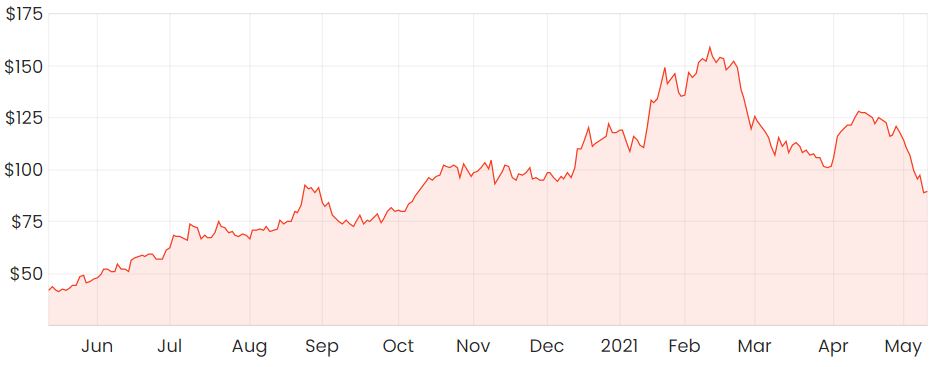Shares in Buy-now-pay-later (BNPL) company Afterpay Ltd (ASX: APT) have slumped another 5% today.
In the past month, Afterpay’s market valuation has tumbled over 30% as investors rotate out of high growth companies that have been the beneficiaries of 2020.
APT share price

Afterpay closely follows the day-to-day market movements of US-listed BNPL Affirm Holdings Ltd (NASDAQ: AFRM). Its shares fell 10% on its last day of trading, so it’s easy to see why our own BNPL sector is struggling today.
Zip Co Ltd (ASX: Z1P) shares aren’t performing as poorly today, but it’s worth noting that Afterpay’s valuation is much higher than Zip’s relative to the revenue that they respectively generate.
How is the underlying business doing?
Afterpay’s most recent Q3 update revealed that the business is still growing despite the fall in its market valuation.
Across the period, underlying sales were up 104% on the prior corresponding period (pcp). North America has been a key growth driver and is now the largest contributor to its underlying sales.
Active customers had increased by 75% to 14.6 million, with North America and the UK reaching 9.3 million and 1.7 million active customers, respectively.
Afterpay is currently working to explore options for a potential US listing due to the US market now being its largest contributor.
Time to buy Afterpay’s shares?
The business still appears to be growing rapidly, which is pleasing to see, but it’s not enough to make me want to be a buyer at these levels.
I’ve long thought that BNPL companies are intrinsically overvalued. Even at current levels, I still think it’s too much to pay for a business that doesn’t seem to have a sustainable competitive advantage.
In its most recent Q3 update, management noted that the top 10% of customers globally, on average, transact 33 times per year, or nearly 3 times per month.
That figure would be extremely impressive assuming that those top customers go on to transact with Afterpay on an extended basis, which would significantly increase metrics such as Average Revenue Per User (ARPU).
With little switching costs as the customer, I struggle to see how transaction frequencies like the ones mentioned can be meaningful if customers are potentially going to switch in the long run.
Moving forward, it will be important to keep track of Customer Acquisition Costs (CAC) and how this compares to the overall value that the average user provides to the business.
For more reading, I’d suggest getting a free Rask account and accessing our full stock reports. Click this link to join for free and access our analyst reports.










